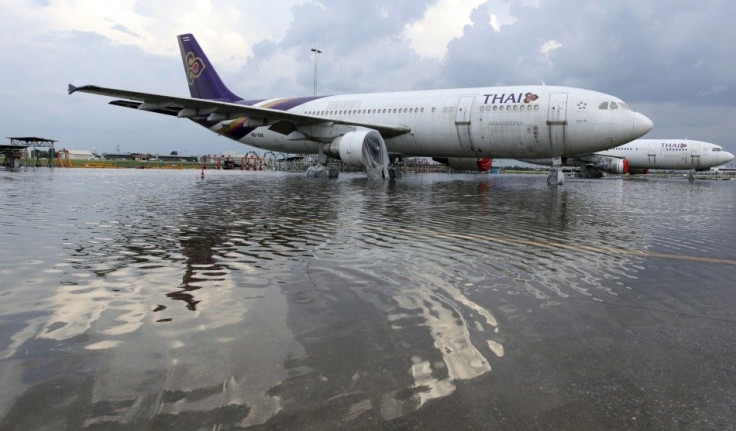Bangkok Flooding 2011: Airport Shuts Down, Hampers Travel

Officials in Bangkok continue to fight off flood waters as they reach Don Muang Airport, just one sign that the tourism industry in Bangkok may take massive losses in 2011.
Efforts to stop flood surges failed at Don Muang Airport, as water spilled onto runways. As of 7 p.m. on Tuesday, all flights from Don Muang Airport were cancelled. The airport normally operates over 150 daily flights by domestic and low cost carriers Nok Air and Orient Thai Airlines.
Both Nok Air and Orient Thai Airlines diverted flights to Suvarnabhumi Airport, the country's main international airport, which is still operating as usual. The Tourism Authority of Thailand remains confident that Suvarnabhumi Airport will remain open, as it is on higher land and protected with an almost 10ft earthen wall.
Don Muang Airport also doubled as Flood Relief Operations Center and shelter for evacuates. The center will remain in the airport, for now.
Water entered seven districts on the outskirts of Bangkok. Authorities are struggling to protect central Bangkok, the main economic center of the country. Prime Minister Yingluck Shinawatra warned in a television address to the country that if water barriers broke, the central city could be covered in almost five feet of water.
The new prime minister also announced a five-day holiday in 21 provinces to allow citizens to prepare and evacuate flooded areas. The city is most nervous about seasonal high tides on Bangkok's Chao Phraya River meeting with excess flood water from the north later this week between October 28 and 30.
Previously, Bangkok had remained largely unaffected by the flood waters that plagued the country for months. The flood has claimed more than 350 lives and displaced nearly 9 million people.
The World Health Organization warns of water-borne and communicable diseases, such as diarrhea and conjunctivitis. Other risks include snake bites and electrocution.
Another concern is the threat of crocodiles that have escaped from flooded farms; Thailand is one of the main exporters of crocodile products. A number have been captured in the Nonthaburi province, outside of Bangkok.
Tourism Minister Chumphol Silpa-archa expects that tourists visiting the country be 500,000 to 1 million below previously expected targets. Tourism is an important industry in Thailand, it employees about 15% of the country and contributes 6% to the country's overall GDP.
Many of the popular tourist destinations in Thailand have remained opened, although many tourist are rebooking trips for a new date. Currently, there are no travel warnings from officials in Bangkok for tourists, as the nation' most visited spots have not been affected.
The south of the country, which is home to popular resort islands like Phuket and Ko Sumai, has remained relatively untouched by the storm.
Nevertheless, Sisdivachr Cheewarattanporn, president of the Association of Thai Travel Agents, said that they expect bookings to drop 20% if floods continue.
The 19 million target this year is now impossible. At best, we can probably do 18 million, Sisdivachr told Reuters.
© Copyright IBTimes 2025. All rights reserved.





















